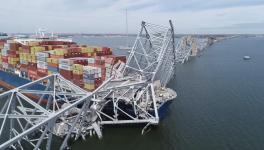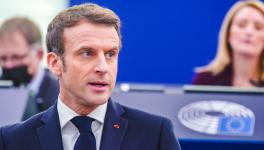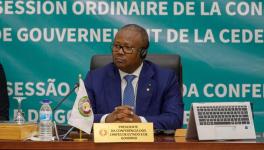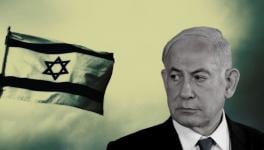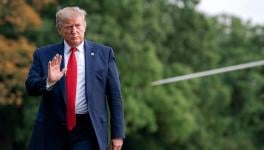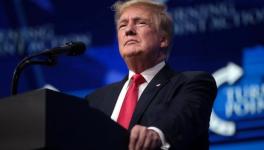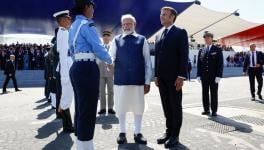Trump-Macron Proposals Jeopardise Iran Nuclear Deal
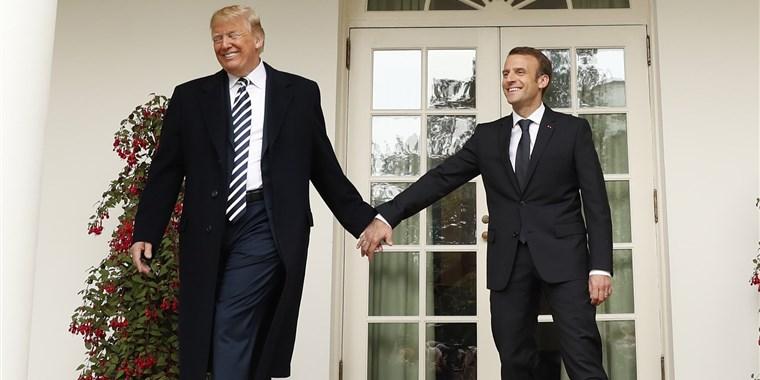
US President Donald Trump’s recent statement on the nuclear deal with Iran has yet again complicated a process that was already reeling under his earlier bellicose statements. Trump, who recently met French President Emmanuel Macron, said, “I think we will have a great shot at doing a much bigger, maybe, deal.” However, his idea of such a deal involves more extreme demands of Iran than were agreed upon earlier.
The new amendments mooted by the two Presidents are in the backdrop of increasing US and French involvement in the conflict in Syria. These include measures that seek to restrict Iran’s role in Syria, Yemen and other parts of West Asia, apart from imposing on Iran a permanent restriction on uranium enrichment and the development of ballistic missiles. Iran has firmly rejected calls for amendments to the original deal and is strongly backed by Russia and China, two of the signatories to the agreement.
Macron has also urged the US President to not pull out American troops from Syria after the defeat of the IS, because doing so, he warned, would amount to conceding ground to Syrian President Bashar Assad and to Iran.
The two Presidents have decided to push for a permanent restriction on uranium enrichment by Iran. The restrictions on uranium enrichment under the previous deal in 2015, known as the Joint Comprehensive Plan of Action (JCPOA), are set to expire in 2025. Early this year, Donald Trump had insisted, “these provisions must have no expiration date. My policy is to deny Iran all paths to a nuclear weapon - not just for ten years, but forever.”
The proposed amendments also cover Iran’s ballistic missile programme. While under the previous 2015 deal, Iran had agreed for the continuation of the UN ban on the import of ballistic missile technology for up to 8 years, the restriction on Iran’s indigenous development of nuclear-capable ballistic missiles was “non-binding”.
Threatening the European co-signatories of the deal that he would withdraw from the agreement by May 12 and reimpose sanctions if his demands were not met, Donald Trump, in a statement issued on January 12, had insisted that the previous deal must be changed to include, among other things, an explicit statement “in United States law - for the first time - that long-range missile and nuclear weapons programs are inseparable, and that Iran’s development and testing of missiles should be subject to severe sanctions.”
This threat came months after his call for new sanctions on Iran and a renegotiation of the JCPOA, on the grounds that Iran had violated parts of the agreement, was rejected by EU's foreign policy chief Federica Mogherini, who maintained that Iran had not violated any part of the agreement and JCPOA could not be renegotiated.
After Iran's Foreign Minister Javad Zarif threatened that if the US withdrew from the nuclear deal, Iran was prepared to resume its nuclear programme "at much greater speed", the French President told Fox news on Sunday, just prior to his visit, that he had no “plan B” in mind to replace the nuclear deal and urged the United States to stay in the agreement in absence of a better option. However, after his state visit to the US, Macron is now on board with Trump’s plan.
Speaking at a U.N nuclear disarmament forum yesterday, Iran’s ambassador to the International Atomic Energy Agency Reza Najafi has refused the call for renegotiation of the treaty. “Our response to that threat is clear and firm: No, the JCPOA will not be renegotiated or altered,” he said.
Russia and China have come out in defense of Iran’s position. Jointly drafting a statement affirming their “unwavering support for the comprehensive and effective implementation” of JCPOA, Russian and China urged all the nations at the UN meeting to sign the statement.
The head of the arms control unit at Russia’s foreign ministry, Vladimir Yermakov, warned at the forum, “Any attempts to amend (the) text for someone´s benefit will inevitably... have powerful negative consequences for regional global stability and security."
Threatened by the possibility of JCPOA now being junked, Angela Merkel, Chancellor of Germany which is also a signatory to the deal, is visiting Washington on Friday “to make a last-minute bid to dissuade Mr Trump from potentially torpedoing the Iran agreement,” BBC reported.
Get the latest reports & analysis with people's perspective on Protests, movements & deep analytical videos, discussions of the current affairs in your Telegram app. Subscribe to NewsClick's Telegram channel & get Real-Time updates on stories, as they get published on our website.









